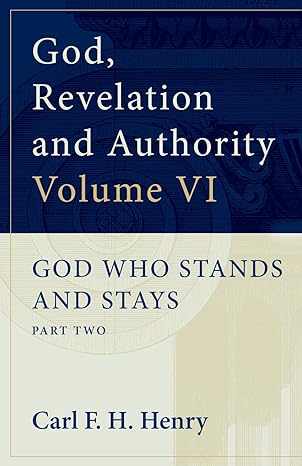A Brief Book Summary from Books At a Glance
by Steve West
About the Author
Carl F. H. Henry was one of the key thinkers and theologians of the evangelical movement in the 20th Century. God, Revelation and Authority is a seminal, multi-volume work of theological and philosophical engagement that has influenced and shaped evangelical thought for decades.
Table of Contents
Postface
1. Shall We Surrender the Supernatural?
2. God’s Transcendence and Immanence
3. The Resurgence of Process Philosophy
4. Election: The Freedom of God
Supplementary Note: Contemporary Debate over Divine Election
5. God the Sovereign Creator
6. Creation Ex Nihilo
7. The Six Days of Creation
8. The Crisis of Evolutionary Theory
9. The Origin and Nature of Man
10. Angels, Satan and the Demons, and the Fall
11. The Goodness of God
12. God and the Problem of Evil
13. Evil as a Religious Dilemma
14. The Fatherhood of God
15. The Holiness of God
16. God’s Incomparable Love
Supplementary Note: On Finding Christ in Nonbiblical Religions
17. The Ministry of the Holy Spirit
18. The God of Justice and of Justification
19. Justice and the Kingdom of God
Supplementary Note: The Christian and Political Duty
20. God Who Stays: Divine Providence
Supplementary Note: Auschwitz As a Suspension of Providence
21. God Who Stays: The Finalities
Summary
Chapters 1-3
Philosophers and many theologians deny that there is a transcendent supernatural being. The idea that there is a categorical distinction between nature and supernature is likewise denied. Everything created should be considered natural, with God alone seen as supernatural: it is the Creator/creation distinction that is vital. Pantheism and panentheism are accepted in place of biblical theism, and divine immanence is seen to eviscerate transcendence. Neither Scripture nor Christian theology isolates God from being present and active in nature, but they both deny that God is organically connected to it. Many contemporary theologians are redefining the term supernatural, so that they reject the historical concept but confusingly employ the word with a new definition. It is essential to see that Scripture teaches divine immanence, and theologians who present transcendence as entailing aloofness or deism are in serious error. Scripture presents God as absolutely transcendent, yet also immanent, creating, sustaining, and governing the world. Neo-Protestant views conflict with one another and suffer from internal contradictions. Secular humanism is most antithetical and opposed to Christian theism, but in reducing everything to nature it cannot provide any meaning or value for life. The supernatural is the ultimate fact and is of ultimate importance; more than anything, we need to understand God.
Scripture clearly teaches both the divine transcendence and immanence of God. Those who deny that we can know the transcendent have to empty the Bible of its truth and power. God is transcendent as creator, governor, redeemer, and judge. Christianity, if anything, is a life under divine authority. God’s self-revealing in Scripture, the incarnation, and creation are essential for a proper understanding of God’s transcendence. To reject the transcendence of God is to reject revealed religion, no matter how much theologians try to evade this entailment. When our relationship to the transcendent God is denied, we lose both God and ourselves. Scripture teaches that the transcendent God is both outside the created order and acts within it. Proper worship and a healthy theology require balancing both in accordance with God’s self-disclosure.
From different angles, positivism and neoorthodoxy both denied that objectively valid truths could be known about God, and thus both helped push biblical theism out of consideration in metaphysics. In contrast, process theology reasserted a theistic metaphysic and connected God to history, nature, and human experience. There is much debate, however, between process theologians about the details of their systems. They replace the finality and authority of God’s Word with their own tentative, developing philosophies. Process thought makes God partly dependent on the world and evolving in improvement; he has potential to develop, rather than infinite perfections. God’s timelessness and immutability are rejected, as are other classical attributes like omnipotence and omniscience. In the end, the process deity cannot be the God of the Bible. The divine being in process theology is mutable, dependent, and contingent: he is not worthy of worship. Numerous biblical doctrines are modified or rejected, and a non-biblical concept of love becomes the controlling interpretive factor. There are already signs that interest in process theology is diminishing, and that its problems are seen as insurmountable. . . .
[To continue reading this summary, please see below....]The remainder of this article is premium content. Become a member to continue reading.
Already have an account? Sign In
